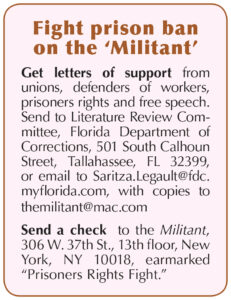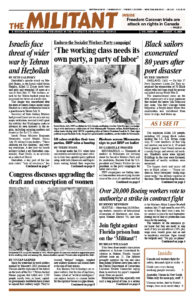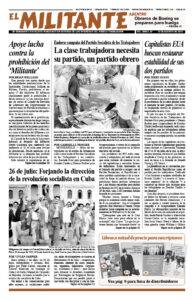It has been three months since prison authorities at Jackson Correctional Institution in Malone, Florida, banned Militant issue no. 17. The Militant promptly appealed the ban and since then dozens of letters have been sent to the Florida Department of Corrections Literature Review Committee urging them to overturn the paper’s impoundment. More are needed.
 Maintaining this ban, especially over such a long period of time, is a serious violation of the constitutional rights of prisoners to read and discuss political literature of their choice, as well as the right of the Militant to reach its readers behind bars.
Maintaining this ban, especially over such a long period of time, is a serious violation of the constitutional rights of prisoners to read and discuss political literature of their choice, as well as the right of the Militant to reach its readers behind bars.
The Literature Review Committee informed Militant attorney David Goldstein that it would hold a hearing July 18 to review the prison authorities’ impoundment. No information on what it decided has been communicated to the Militant or its attorney since then.
This underscores the importance of continuing to urge the Literature Review Committee to overturn the ban. Individuals and organizations that have already submitted letters can request an update from authorities on where this case stands.
Why is it important for all those defending constitutional freedoms to continue to speak out against the banning of the Militant?
The prison authorities objected to the Militant printing a widely circulated Associated Press photo accompanying an article in the paper opposing Jew-hatred. It shows the body of a Jewish man murdered by Hamas during its Oct. 7 pogrom in Israel being driven around Gaza City to cheers by the Islamist thugs’ supporters.
Jackson Correctional Institution officials wrote, “Picture shows dead person being paraded around on a motorcycle; Magazine depict hatred toward a specific race.”
“Nothing could be further from the truth,” said Militant editor John Studer. “The Militant doesn’t depict hatred toward any race. It opposes Jew-hatred and calls for uniting Jewish, Arab, immigrant and other workers to defend their common class interests.
“At issue,” he continued, “are the rights of prisoners to read what they wish and to form their own opinions about political developments outside of prison walls. Another question is freedom of the press, and the rights of the Militant to reach the growing number of readers it has among workers behind bars.”
Prison authorities claim the photo is “dangerously inflammatory” and violates prison rules, by encouraging “riot, insurrection, rebellion” and “organized prison protest.”
“Nothing in the photo, even standing alone, could possibly be construed as advocating or encouraging riot, insurrection, etc.,” Goldstein wrote in his appeal of the ban on the paper.
Among organizations that have sent letters calling for the ban to be overturned are the American Civil Liberties Union in Florida and nationwide, Florida Press Association, PEN America, Amnesty International and others.

